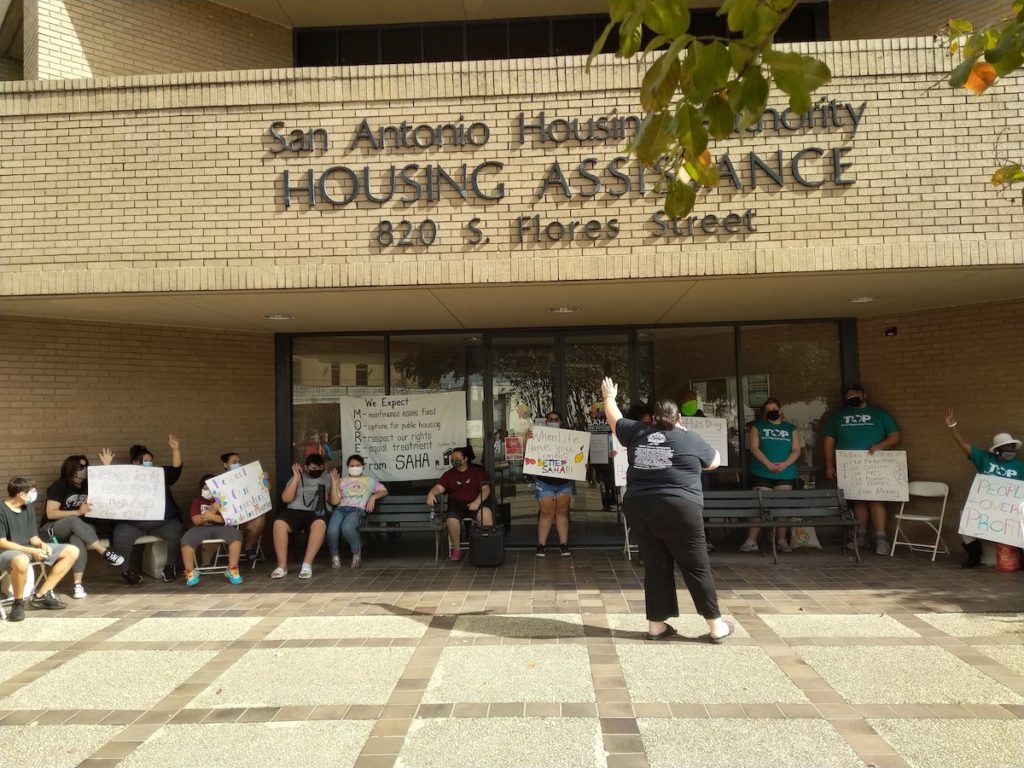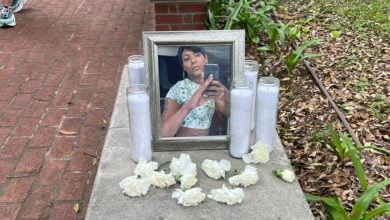On January 21, advocates for people-centered public housing in San Antonio received incredible news: the San Antonio Housing Authority canceled their contract with mega-developer NRP Group to demolish and redevelop the largest public housing complex in San Antonio, the Alazán Courts. The plan would have displaced over 1,200 low-income residents and boosted the ongoing effort to gentrify San Antonio’s historic Westside.
The reversal is a sudden, unexpected victory for organizers who have struggled against privatization schemes for years. In addition, the CEO of SAHA resigned suddenly in a move that seems to be a result of the prolonged struggle.
SAHA targets a public housing anchor for demolition
The Alazán Courts are one half of the Alazán-Apache Courts, the oldest and largest public housing complex in San Antonio. Los Courts, as they are known locally, were constructed as part of New Deal housing initiatives for Mexican American families under the segregated housing policies of the time (1940). Their legacy in the cultural heart of San Antonio – the poor and working class Westside – recently landed the apartments on the National Trust for Historic Preservation’s list of America’s 11 Most Endangered Historic Places.
Situated on the namesake Alazán and Apache Creeks of the Westside, near the expanding downtown campus of the University of Texas-San Antonio, the Alazán-Apache Courts have been marked by private developers for years. Both creeks have recently seen public investment in “beautification” projects, causing real estate prices to steadily rise.
Under the management of former SAHA Chief Executive Officer, David Nisivoccia, the housing authority first moved to redevelop the Alazán Courts in a public-private partnership deal in 2017. While that plan eventually fell through, SAHA moved aggressively in 2020, teaming with Cleveland-based development firm NRP Group on the redevelopment plan.
SAHA used a “time-honored” formula of neglect, bureaucracy, and private “solutions” seen in gentrification and privatization projects across the country. First, the agency allowed properties under their charge to fall into disrepair. Over the time that Nisivoccia was CEO, HUD inspections revealed a rapidly decreasing standard of living in SAHA facilities. During Nisivoccia’s tenure from 2016 to 2020, the number of buildings failing inspection increased from one to eleven.
SAHA then utilized resident frustrations with living conditions to push for private redevelopment of the Alazán Courts. With a lack of options from public officials, and facing neglect from the agency charged with maintenance of public housing, some residents became advocates for the redevelopment plan. But when the details started to emerge, it was clear that the plan only benefited developers at the expense of working class residents.
NRP Group and SAHA trumpeted that the plan would increase the original 501 units into approximately 650 units at the site, but it would have provided only 66 units for residents earning under 30% of the city’s Annual Median Income. Alazán residents make only $8,800 per year on average. Over 90% of current residents would be unable to afford units over the 30% AMI in the new development, leaving hundreds of people and whole families displaced.
SAHA pledged to put the current Alazán residents at the front of the public housing and Section 8 voucher wait list. SAHA clearly made this move as a faux concession to activists, but at the expense of the 45,000 families on the wait list for public housing.
The critics further pointed to the debacle of demolition and redevelopment of the Wheatley Courts in the gentrifying, and historically Black, Eastside neighborhood in 2014. This resulted in the displacement and scattering of residents. After another mixed-use development and empty promises from SAHA, only 15% of residents have returned to the area, and the new properties already failed their HUD inspections. With such a similar betrayal just six years ago, why would residents trust SAHA to make things right by residents this time?
Westside Community gets organized, fights back
Numerous well respected community organizations came together in the fight against the Alazán Courts plan. The Esperanza Peace and Justice Center, with their anti-gentrification “Mi Barrio No Se Vende” campaign, joined in coalition with the Historic Westside Residents Association, defending the interests of Westside residents. These two organizations began the task of organizing Alazán-Apache Courts residents and training them to become leaders in the defense of their community. In time, they were joined by several other housing advocates and non-profits, forming the Coalition for Tenant Justice over the latter half of 2019. The coalition launched a vocal and unified effort against SAHA negligence, privatization and unaccountability. Nisivoccia was firmly in their cross-hairs.
The COVID-19 pandemic deepened the existing housing crisis at a time when SAHA was reducing the amount of public housing stock available to the poorest residents. This brought more attention to the redevelopment plans and folded even more people into the fight.

Victories emerge as SAHA abruptly reverses course
In October 2020, SAHA was just breaking ground on an unpopular mixed-income development, situated directly between the Alazán Courts and the Apache Courts, when Nisivoccia announced he was resigning his post at SAHA and taking on the same position with the Denver Housing Authority. While Nisivoccia claimed it was coincidental, organizers believe that his resignation was due to immense pressure put on him from anti-gentrification, anti-privatization campaigns.
A few days later, the SAHA Board of Commissioners voted to authorize the demolition of the Alazán Courts before redevelopment plans had even been finalized. The Coalition for Tenant Justice organized over 60 people to speak against the demolition. Despite clear public opposition, the board cut allotment of public speaking time in half and quickly voted 5-2 in favor of demolition. The community was left feeling unheard, disrespected and outraged.
On November 21, roughly 80 people protested at the SAHA headquarters and marched to the front door of Nisivoccia’s apartment, giving the embattled CEO the send-off he deserved. In response, Nisivoccia and SAHA Board Chair, Cha Guzman, wrote an absurd and lengthy open letter to Graciela Sánchez, Director of the Esperanza Peace and Justice Center, falsely accusing the protestors of violence and anti-Semitism. The letter backfired because media documentation of the protests completely contradicted their slanderous narrative against protesters. Through December, tensions with SAHA eased a bit, with the coalition focusing on providing aid for SAHA tenants and speaking out about the need for resident input into the search for the next SAHA CEO.
During a city council meeting on January 21, Shirley Gonzalez, the city council representative for the district where the Alazán-Apache Courts are located, stunned everyone with a sudden announcement:
“I was notified a few days ago that the project at Alazán is no longer happening. SAHA canceled its contract with NRP for the redevelopment of the Alazán.”
In a presentation later that day, SAHA outlined a “New Approach for Alazán,” including “self-development” of Alazán, no relocation of residents, maintenance or increase of the number of public housing units, and SAHA management of the property instead of privatization.
The new approach represented a complete reversal of past SAHA actions and priorities, clearly influenced by the community’s fight against the privatization of public housing.
Struggle for housing justice continues
Westside residents, SAHA tenants and housing advocates struggled in 2020 to make housing a human right united under the slogan, “People Over Profit.” With the exodus of privatizer SAHA CEO David Nisivoccia and the cancellation of the contract with NRP Group to redevelop the Alazán Courts, incredible strides have been made, but there is much work yet to be done.
SAHA tenants are still fighting to make their voices and needs central in the search for the next CEO of the agency. Further, hundreds of Alazán-Apache residents alone, along with countless tenants in the city, are behind on their rent and face the threat of eviction. Maintenance issues and neglect of entire buildings still need to be addressed. The SAHA board still desires the demolition of the courts. And while recent events have dealt a blow to developers, they are certain to continue their pursuit of profiting from the dispossession of residents damaged by the concurrent health, economic and housing crises.
What the long struggle against public housing privatization has shown above all else is that with the people united and organized to fight back, we can win. The path is not likely to get easier, but those in the struggle for housing justice in San Antonio are riding into 2021 confident and in solidarity. ¡El pueblo unido jamás será vencido!





